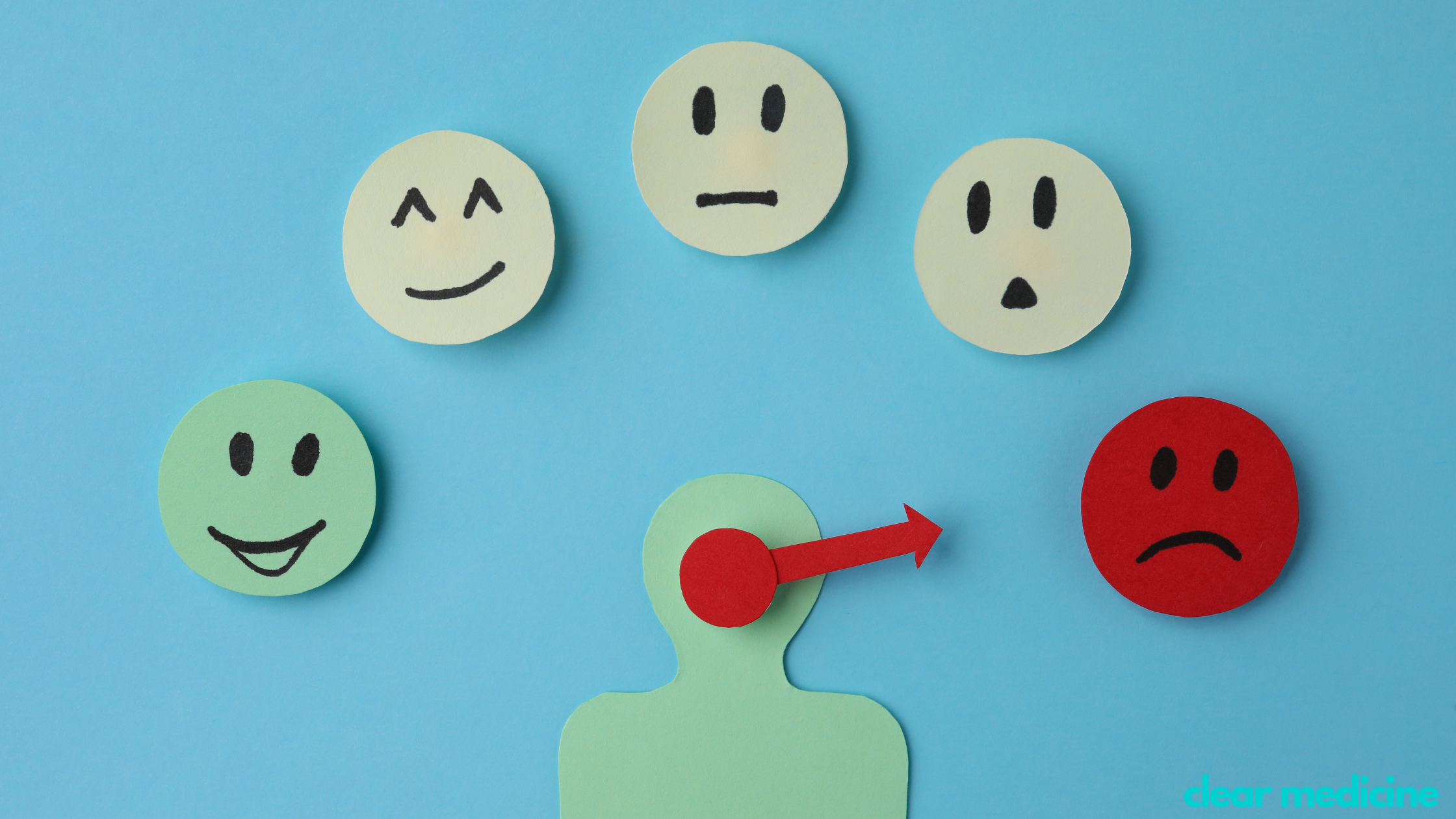
Check off all that apply to you and total your score.
| PMS characterized by hypoglycemia, sugar cravings and/or depression | |
| Feeling wired at night | |
| Lack of sweating | |
| Poor memory | |
| Loss of libido | |
| Depression, anxiety, irritability or seasonal affective disorder | |
| Loss of motivation or competitive edge | |
| Low self-esteem | |
| Inability to make decisions | |
| Obsessive-compulsive disorder | |
| Bulimia or binge eating | |
| Fibromyalgia | |
| Increased pain or poor pain tolerance | |
| Headaches or migraines | |
| Cravings for sweets or carbohydrates | |
| Constant hunger or increased appetite | |
| Inability to sleep in no matter how late going to bed | |
| Less than 7½ hours of sleep per night | |
| Irritable bowel | |
| Constipation | |
| Nausea | |
| Use of corticosteroids | |
| TOTAL (Warning Score: > 4) |
Serotonin is often thought of as our “happy hormone,” especially because its production increases when we’re exposed to natural sunlight and when we focus on one thing rather than multi-tasking. Production of serotonin is also closely linked to availability of vitamin B6 and the amino acid tryptophan. If our diet lacks sufficient protein or vitamins, we run a greater risk of serotonin deficiency. We may also experience a dip in serotonin in relation to physiological causes, dieting, digestive disorders, and stress, since high levels of the stress hormone cortisol rob us of serotonin.
Serotonin exerts a powerful influence over your mood, emotions, memory, cravings (especially for carbohydrates), self-esteem, pain tolerance, sleep habits, appetite, digestion, and body temperature regulation. When we’re feeling down or depressed, we naturally crave more sugars and starches to stimulate the production of serotonin. The World Health Organization projects that depression and anxiety will soon be the number one disability experienced by adults. Plenty of sunlight, a healthful diet rich in protein, minerals, and vitamins, regular exercise, and good sleep support serotonin production. When we measure our current lifestyle against all the elements necessary for the body’s natural production of serotonin, the wide-ranging epidemic of low serotonin is certainly not surprising. Add in chronic stress and out-of-control multi-tasking—two of the main causes of serotonin depletion—and it’s no wonder many of us suffer from depleted serotonin.
Though serotonin is typically recognized as a brain chemical, most of this neurotransmitter is produced in the digestive tract. Now we understand that excess carb consumption causes weight gain, and possibly insulin resistance. While antidepressant medications such as selective serotonin reuptake inhibitors (SSRIs) are effective in raising serotonin in the short term, some evidence suggests these medications actually deplete it in the long term. Plus, weight gain is one of the most common side effects of antidepressant drugs.
Serotonin is just one of a host of neurotransmitters secreted by the brain to regulate mood, attention and energy levels. Ongoing stress, just like depression, can deplete our serotonin reserves, leading to intense food cravings, particularly for sugar and refined carbohydrates that tend to mimic the soothing effects of serotonin. Persistently low serotonin leads to sagging energy, bouts of depression, worrying and dwelling, low self-esteem, difficulty making decisions, early morning waking and compulsive eating. New research from John Hopkins also suggests that serotonin degeneration is associated with problems with memory and may be associated with cognitive decline and Alzheimer’s disease. Therefore, recognizing and treating low levels of serotonin may provide an early source of intervention. Read the complete study results here.
Clear Mood Serotonin Support Formula. This effective formula contains all the ingredients to increase your serotonin for better mood, appetite, sleep, digestion, memory, and pain relief. It includes the vitamin B6, B12, and folate that are needed for serotonin production and the nutrients 5-HTP and St. John’s Wort. St. John’s Wort is an herb that has been proven effective for easing mild to moderate depression. It appears to work as a natural SSRI by preventing the breakdown of serotonin in the brain. 5-hydroxytryptophan (5-HTP), a derivative of tryptophan and one step closer towards becoming serotonin, has been found to be more effective than tryptophan for treating sleeplessness, depression, anxiety, and fibromyalgia. The suggested dose is two to four capsules before bed, and/or one or two capsules in the morning. If it makes you feel nauseous when taken on an empty stomach in the morning, try it with larger meals or at bedtime instead. Shop here.
Rhodiola. Rhodiola may enhance learning capacity, memory, and mood regulation. It may also help fight depression by stimulating the activity of serotonin and dopamine in the brain. The most common dose is 200–400 milligrams each day, preferably in the morning. Shop here.
• Eating the right carbohydrates. Choose slow-release complex carbs, including quinoa, sweet potato or baby red potatoes, once daily, to keep you sustained, energized, and balanced. Simple carbs such as white bread and pastries will only give you a momentary boost followed by a crash. Plus, they pack on the fat.
• The best food sources of serotonin-boosting tryptophan are brown rice, cottage cheese, meats and sesame seeds. The grain chia contains tryptophan too.
• Meditate or focus your mind on one thing. Avoid multi-tasking. Or hang out with people who meditate. Being around these people, well . . . it’s proven to benefit your serotonin status. There are plenty of meditation apps to guide you.
• Sun exposure.
• Stay warm.
• Exercise. Aim for at least 150 minutes per week.
• Massage.